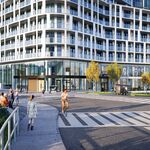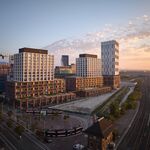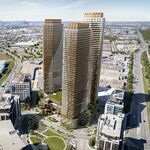unimaginative2
Senior Member
Blowing that condo bubble bigger, and bigger, and bigger
JOHN BARBER
November 17, 2007
In Amsterdam in 1636, a single tulip bulb could sell for the contemporary equivalent of a nice view from the 47th floor above downtown Toronto. But the price of the condo is still rising. Nobody knows how much it will be worth tomorrow, although many are speculating.
If the inevitable real-estate cycle had any sense of drama - or farce - it would designate this week as the top of the wheel and the height of folly.
First came the money-mad "launch" of 1 Bloor East, the epitome of a frenzy. One man who held a place for a real-estate agent in the ruly mob that camped for days beneath the hoarding told The Globe and Mail he earned $2,000 for the service. Given the way prices rose throughout Tuesday's launch, that payment was likely a "sound investment," to use a phrase often heard in this market.
Every day brings more strange tales of the Bloor Street frenzy, the latest involving alleged ethnic conflicts among competing agents. The whole business is so crazy it seems fated to end badly - just as so many panicky property grabs did in 1989, when the market last collapsed.
But the 80-storey, Kazakh-financed Bloor Street tower had less than a week to shine as the city's tallest theoretical residential building before a usurper appeared. Yesterday, a competing developer unveiled an equally dramatic and potentially taller condominium tower, called Aura, to be built on Yonge Street at the northwest corner of Gerrard Street.
Height matters in this game, with steadily rising prices charted on a giddily up-thrusting skyline. Michael La Brier, president of developer Canderel Stoneridge, said that his 75-storey Gerrard Street tower will actually be taller than the 80-storey tower Bazis International wants to build on Bloor Street. But his estimate would seem to discount the "architectural fins" that knife the clouds above his competitor's building, varying in height from one sexy drawing to another, as marketing demands.
As of now, Mr. La Brier said, Aura, billed as "Canada's largest condo tower," is also taller. "If they go higher," he added, "I really don't care."
Really?
Design is the focus of a healthier competition among today's high-rise developers. Canderel Stoneridge only won approval for its tower after agreeing to spectacular architecture, as determined by what the developer called an "international architectural peer review process." The impressive design that resulted, by architects Graziani +
Corazza, has become the building's main selling point.
Meanwhile, Bazis keeps adjusting its own design. Most recently, it acquired two vastly expensive properties just south of its site in order to create a heftier base for its fin-topped tower.
The freakier the tulip, the more desirable it is - given the right circumstances.
Mr. La Brier is well aware of the phenomenon, which he described as the "greater fool theory." People will happily pay more than something is worth as long as there appears to be a renewing supply of gulls to sell it to.
That's what drove Toronto's last speculative housing boom, according to Mr. Le Brier. But this one, he insisted, is different. "Any building properly placed and properly priced will sell," he said.
As of now, prices at Aura will be about $500 a square foot, according to the developer. He expects about half the buyers to be "investors" rather than residents. As for 1 Bloor East, he added, "I don't think anybody has any idea what their pricing is."
The Toronto boom becomes all the more remarkable when seen in light of the U.S. real-estate collapse. The day people went crazy on Bloor Street, Reuters reported condo fraud so rampant that mortgages on as many as 200 suites in a single 43-storey Miami condo fell into foreclosure before anybody moved in, the result of complicated scams hinging on deliberately inflated prices.
A day later, ABC reporter Jeffrey Kofman went to Miami to report on the larger picture. "Since the South Florida condo market peaked two years ago in a frenzy of hype and a seductive aura of easy money, sales have stalled, prices have been in a free-fall," he reported. The state is now infested with "condo vultures" feasting amid the devastation.
In downtown San Diego recently, developers converted a just-completed "luxury condo" into affordable housing after wealthy buyers failed to appear. No wonder: They all joined the rush to Toronto.
If everything goes well, greater fools will soon follow to join the canny investors who are minting money in the current craze. The problem, as everybody knows, is that there are never enough of them.
jbarber@globeandmail.com
JOHN BARBER
November 17, 2007
In Amsterdam in 1636, a single tulip bulb could sell for the contemporary equivalent of a nice view from the 47th floor above downtown Toronto. But the price of the condo is still rising. Nobody knows how much it will be worth tomorrow, although many are speculating.
If the inevitable real-estate cycle had any sense of drama - or farce - it would designate this week as the top of the wheel and the height of folly.
First came the money-mad "launch" of 1 Bloor East, the epitome of a frenzy. One man who held a place for a real-estate agent in the ruly mob that camped for days beneath the hoarding told The Globe and Mail he earned $2,000 for the service. Given the way prices rose throughout Tuesday's launch, that payment was likely a "sound investment," to use a phrase often heard in this market.
Every day brings more strange tales of the Bloor Street frenzy, the latest involving alleged ethnic conflicts among competing agents. The whole business is so crazy it seems fated to end badly - just as so many panicky property grabs did in 1989, when the market last collapsed.
But the 80-storey, Kazakh-financed Bloor Street tower had less than a week to shine as the city's tallest theoretical residential building before a usurper appeared. Yesterday, a competing developer unveiled an equally dramatic and potentially taller condominium tower, called Aura, to be built on Yonge Street at the northwest corner of Gerrard Street.
Height matters in this game, with steadily rising prices charted on a giddily up-thrusting skyline. Michael La Brier, president of developer Canderel Stoneridge, said that his 75-storey Gerrard Street tower will actually be taller than the 80-storey tower Bazis International wants to build on Bloor Street. But his estimate would seem to discount the "architectural fins" that knife the clouds above his competitor's building, varying in height from one sexy drawing to another, as marketing demands.
As of now, Mr. La Brier said, Aura, billed as "Canada's largest condo tower," is also taller. "If they go higher," he added, "I really don't care."
Really?
Design is the focus of a healthier competition among today's high-rise developers. Canderel Stoneridge only won approval for its tower after agreeing to spectacular architecture, as determined by what the developer called an "international architectural peer review process." The impressive design that resulted, by architects Graziani +
Corazza, has become the building's main selling point.
Meanwhile, Bazis keeps adjusting its own design. Most recently, it acquired two vastly expensive properties just south of its site in order to create a heftier base for its fin-topped tower.
The freakier the tulip, the more desirable it is - given the right circumstances.
Mr. La Brier is well aware of the phenomenon, which he described as the "greater fool theory." People will happily pay more than something is worth as long as there appears to be a renewing supply of gulls to sell it to.
That's what drove Toronto's last speculative housing boom, according to Mr. Le Brier. But this one, he insisted, is different. "Any building properly placed and properly priced will sell," he said.
As of now, prices at Aura will be about $500 a square foot, according to the developer. He expects about half the buyers to be "investors" rather than residents. As for 1 Bloor East, he added, "I don't think anybody has any idea what their pricing is."
The Toronto boom becomes all the more remarkable when seen in light of the U.S. real-estate collapse. The day people went crazy on Bloor Street, Reuters reported condo fraud so rampant that mortgages on as many as 200 suites in a single 43-storey Miami condo fell into foreclosure before anybody moved in, the result of complicated scams hinging on deliberately inflated prices.
A day later, ABC reporter Jeffrey Kofman went to Miami to report on the larger picture. "Since the South Florida condo market peaked two years ago in a frenzy of hype and a seductive aura of easy money, sales have stalled, prices have been in a free-fall," he reported. The state is now infested with "condo vultures" feasting amid the devastation.
In downtown San Diego recently, developers converted a just-completed "luxury condo" into affordable housing after wealthy buyers failed to appear. No wonder: They all joined the rush to Toronto.
If everything goes well, greater fools will soon follow to join the canny investors who are minting money in the current craze. The problem, as everybody knows, is that there are never enough of them.
jbarber@globeandmail.com




